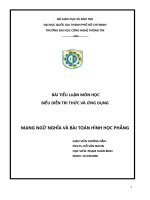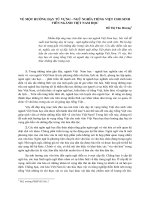En11 từ vựng ngữ nghĩa học bài 4
Bạn đang xem bản rút gọn của tài liệu. Xem và tải ngay bản đầy đủ của tài liệu tại đây (84.85 KB, 4 trang )
<span class="text_page_counter">Trang 1</span><div class="page_container" data-page="1">
<b>MID-TERM TEST ON LEXICOSEMANTICSFOR STUDENTS OF ENGLISH (No 2)</b>
<b>Subject Code: EN11</b>
Full name: Date of birth: Student’s ID:
<b>I. Answer the following questions</b>
<i>1. What are the types of word? Their typical features? Give some examples.</i>
The main types of words are: determines, nouns, verbs, adverbs, conjunctions,pronouns, prepositions and adjectives.
determines: a, an, the (articles), my, some (pronoun), 2, 14 (numbers)nouns: student, computer
verbs: learn, study
adverbs: lovely, carefully
conjunctions: and, or, when, butprepositions: of, in
pronouns: I, myself adjectives: yellow, nice
<i>2. What are the types of morphemes? Their typical features? Give someexamples.</i>
There are two types of morphemes: free morphemes and bound morphemes.Free morphemes can stand alone and don't need to be attached to any othermorphemes to get their meaning. Most words are free morphemes, such as theabove-mentioned words house, book, bed, light, world, people, and so on.
Bound morphemes, however, cannot stand alone. The most common example of
<i>bound morphemes are suffixes, such as -s, -er, -ing, and -est.</i>
</div><span class="text_page_counter">Trang 2</span><div class="page_container" data-page="2">Examples: teacher (free morphemes: teach; bound morpheme: -er)
centralization (free morphemes: centre; bound morpheme: -al, -ize,-ation)
<b>II. Exercises</b>
Exercises on PrefixesI.
<b>a) In my opinion this book is just pseudo-intellectual rubbish.</b>
<b>b) Although he was older than his wife, he outlived her by ten years.</b>
c) Priests are not often ambitious men, but he had set his heart on becoming
<b>h) He uses pseudo-scientific language to persuade his readers.</b>
<b>i) These squalid, dark, cramped, malodorous rooms are homes towhole families</b>
</div><span class="text_page_counter">Trang 3</span><div class="page_container" data-page="3"><i>g) an arch-villain: an especially bad villain</i>
<i>h) to outstay your welcome: to continue to stay in a place although other people</i>
want you to leaveIII.
<b>a) The British Museum was built in the middle of the last century in the classical style popular at that time.</b>
<b>neo-b) Who can foretell what the future holds for us?</b>
c) It’s no use asking him about the political system or the parties. He didn’t
<b>know or care. He’s completely apolitical.</b>
d) It’s quite normal to complain if you think something is wrong, but I do feel
<b>that you are sometimes hypercritical.</b>
<b>e) The authorities are concerned at the activities of a small neo-Nazi movement.f) You must be very careful what you say about her poems. She’s a hyper-sensitive person.</b>
g) She didn’t know the difference between right and wrong. She had no
<b>conscience of all. She was simply amoral.</b>
<b>h) The police claimed that she had some foreknowledge of the murder attempt</b>
and could have prevented it.
<b>i) He was standing in the middle, in the foreground of the picture.</b>
<b>j) Young children can sometimes be hyperactive, which means that they can’t</b>
keep still.IV.
<i>a) neo-imperialism: new imperialism</i>
<i>b) an atheist: someone who believes that no god or gods exit.</i>
<i>c) a foretaste: an experience that lets you know in advance what something will</i>
</div><span class="text_page_counter">Trang 4</span><div class="page_container" data-page="4"><i>h) a neo-Farcist: new form of Farcist</i>
<b>George Willis was born in 1990 and was too young to go into university in theFirst World War, which took place in the second decade of the century. Instead</b>
he finished his schooling and went to university. Like most Oxford colleges, his
<b>college was built round a quadrangle and a photograph of him there shows himwearing a monoglass in his eye, one of his many eccentricities. He rode atricycle, declaring it to be safer and more stable than a bicycle. His subject waszoology. Initially he studied biology, but soon tired of two-legged creatures andtook an interest in quadruped, developing a special affection for elephants.</b>
Howerver, all animal life fascinated him and he was often to be seen in the
<b>Oxforshire countryside, observing wildlife through his binoculars or setting uphis tripod to record it in photographs. Marine creatures also attracted him,especially, for some reason, the octopus. He was also creative in such diversefields as engineering (he proposed a scheme for monorail transport in London).</b>
</div>








